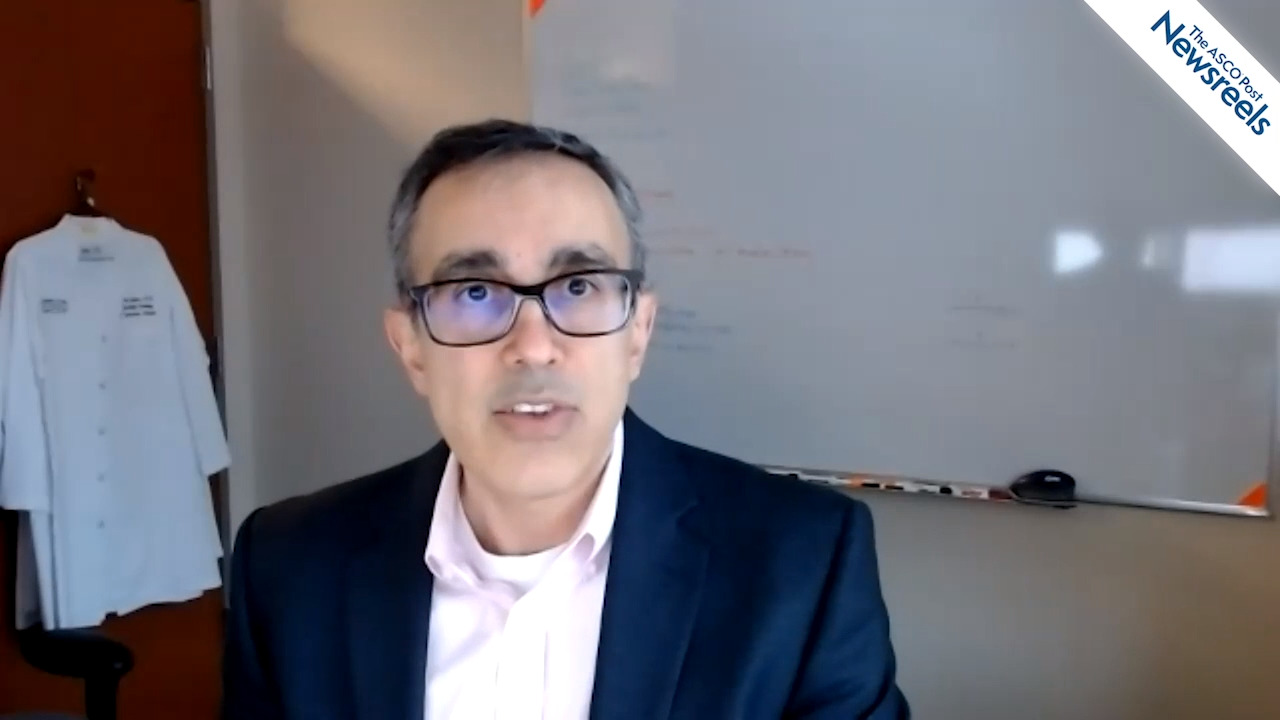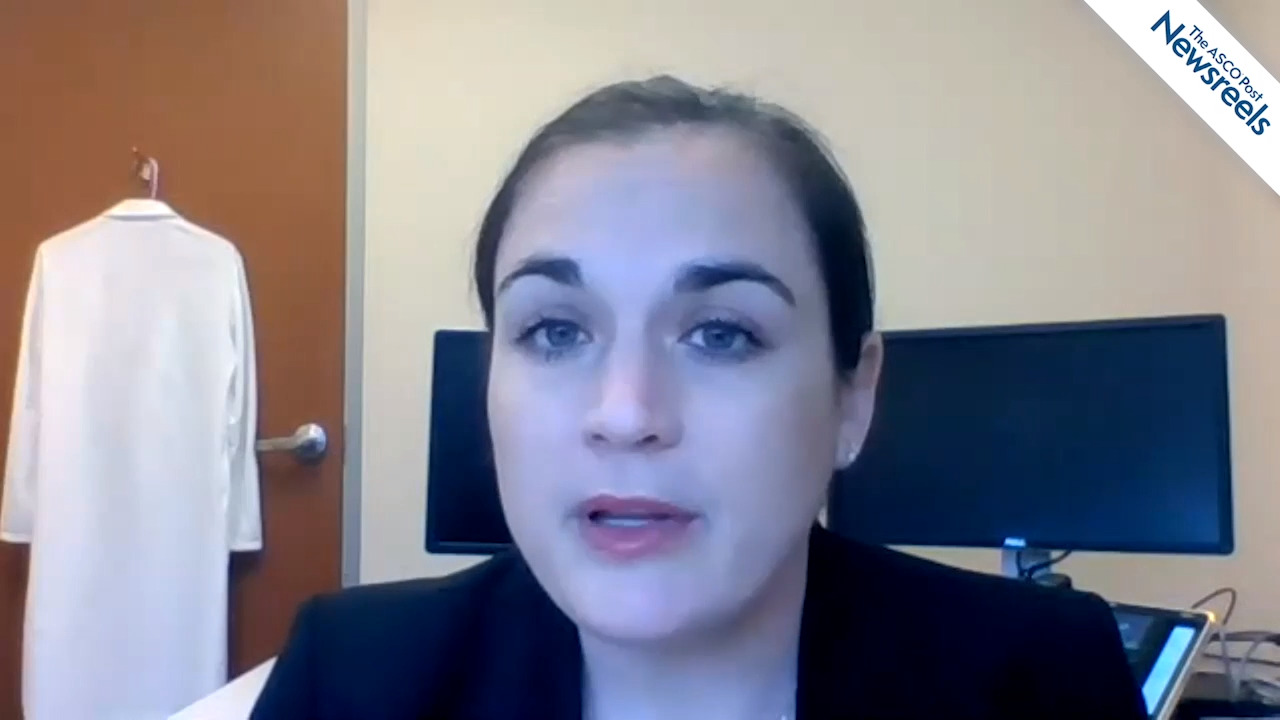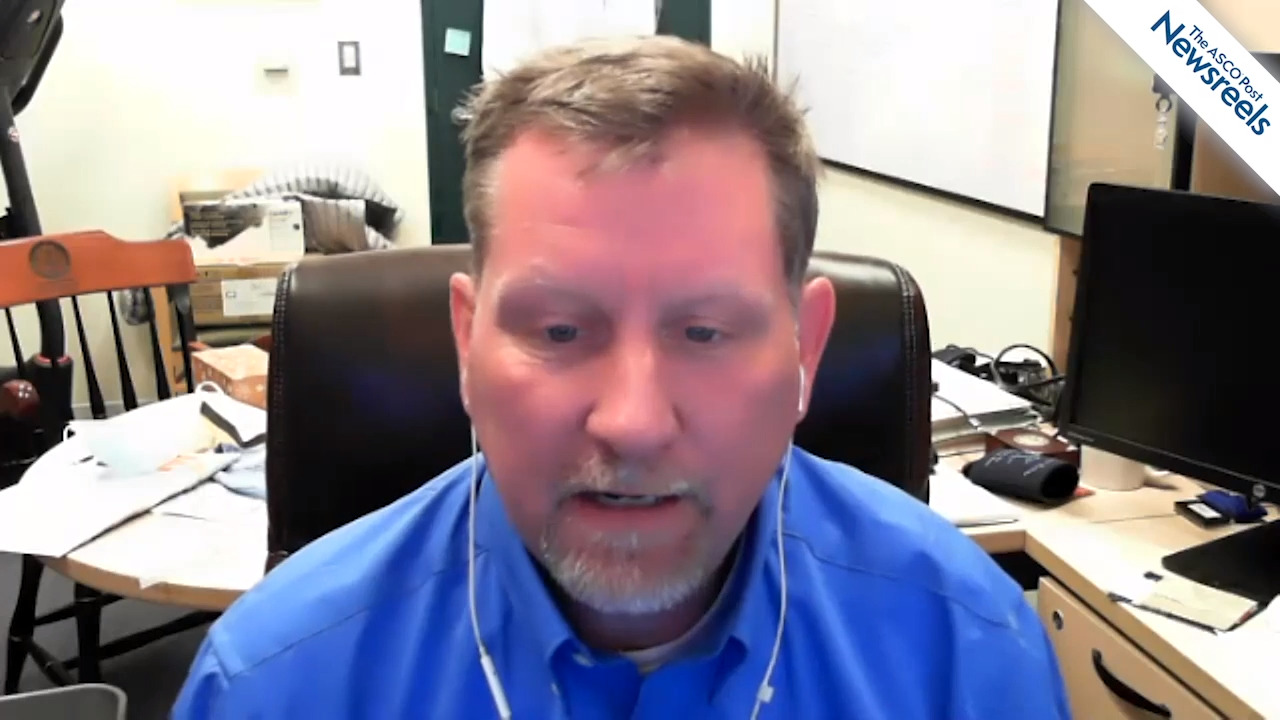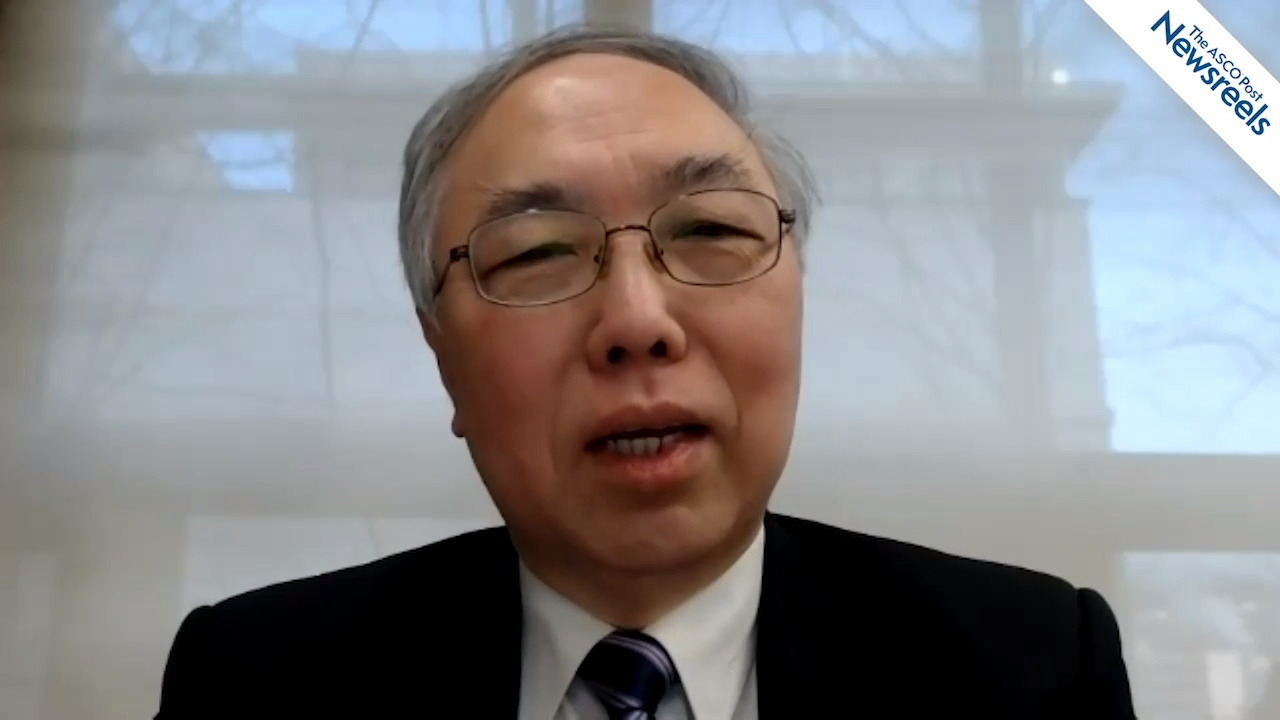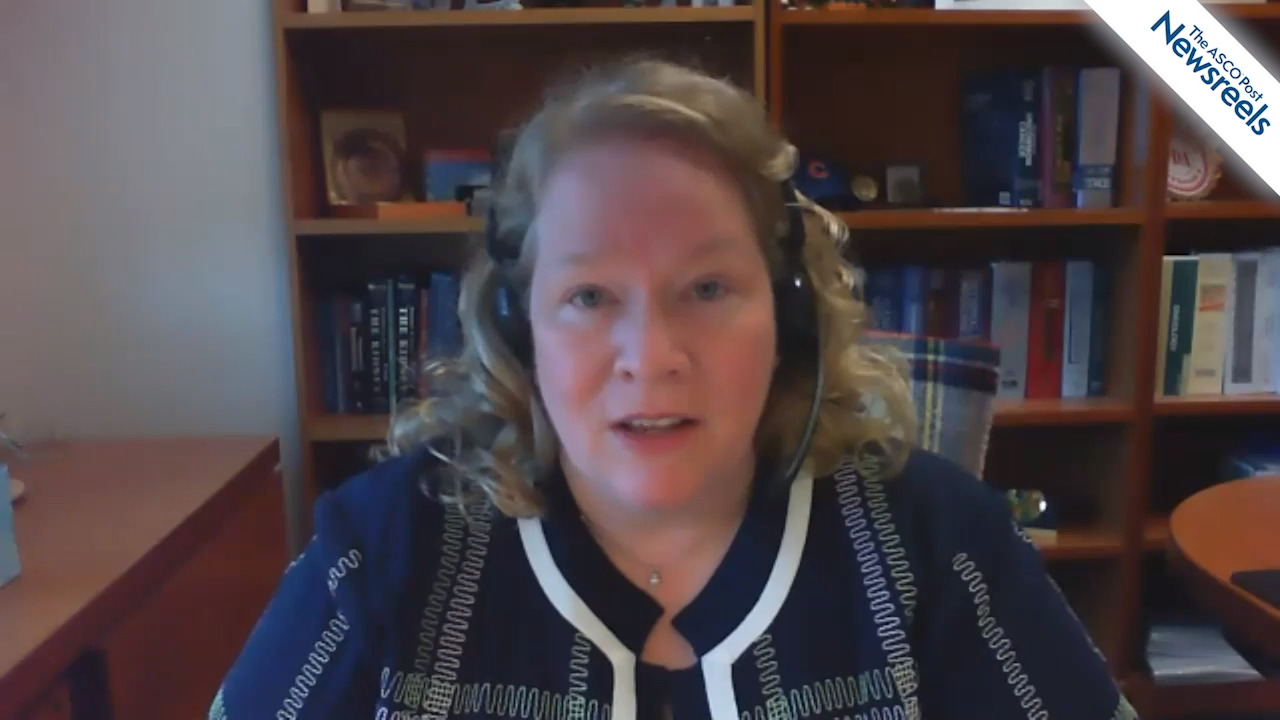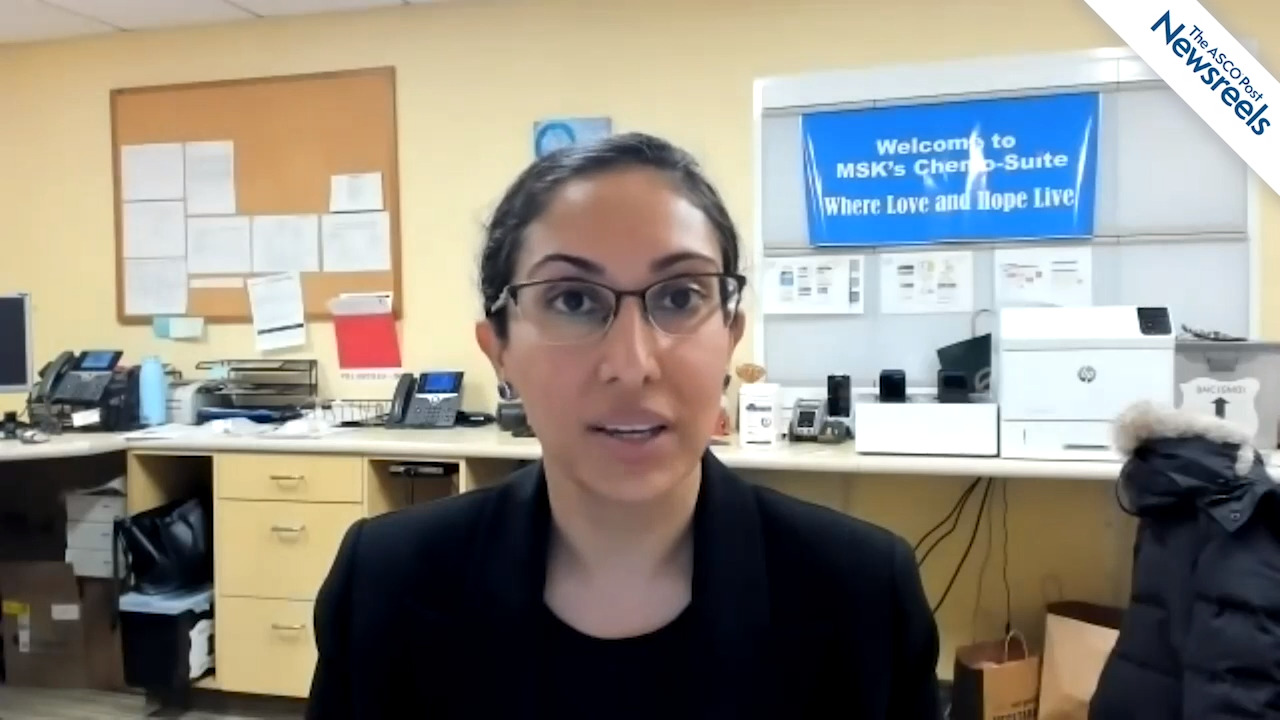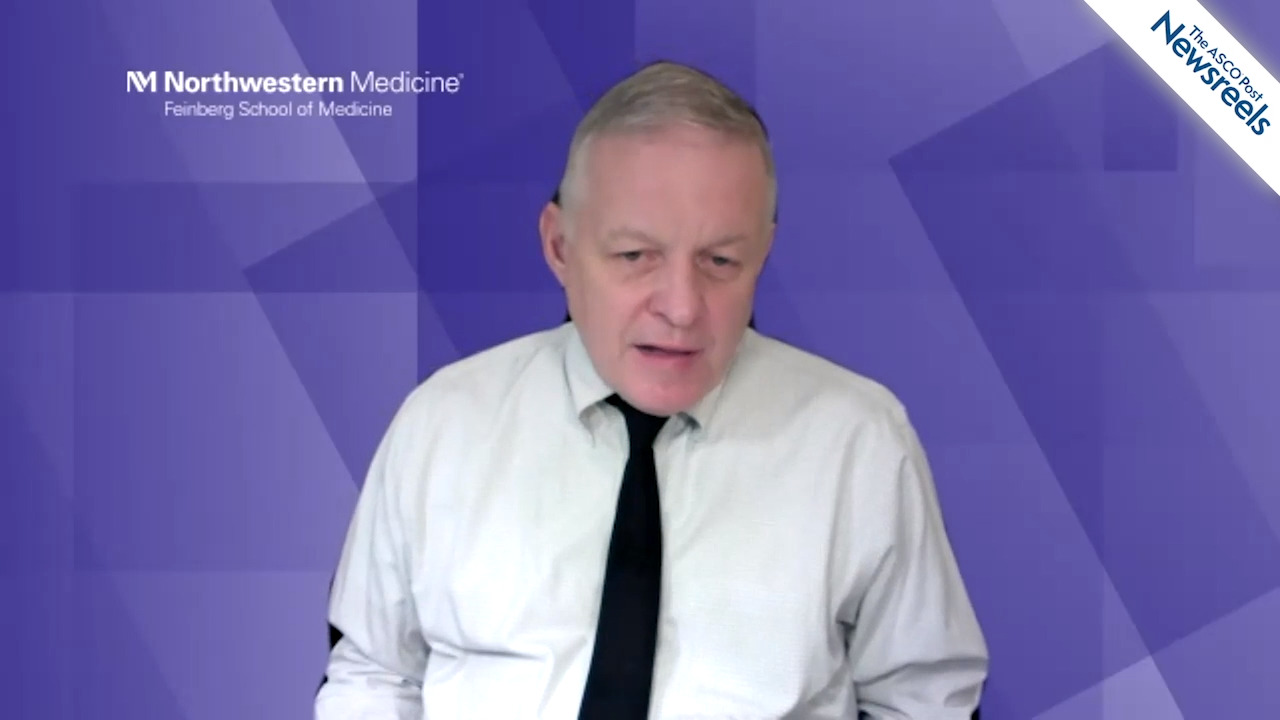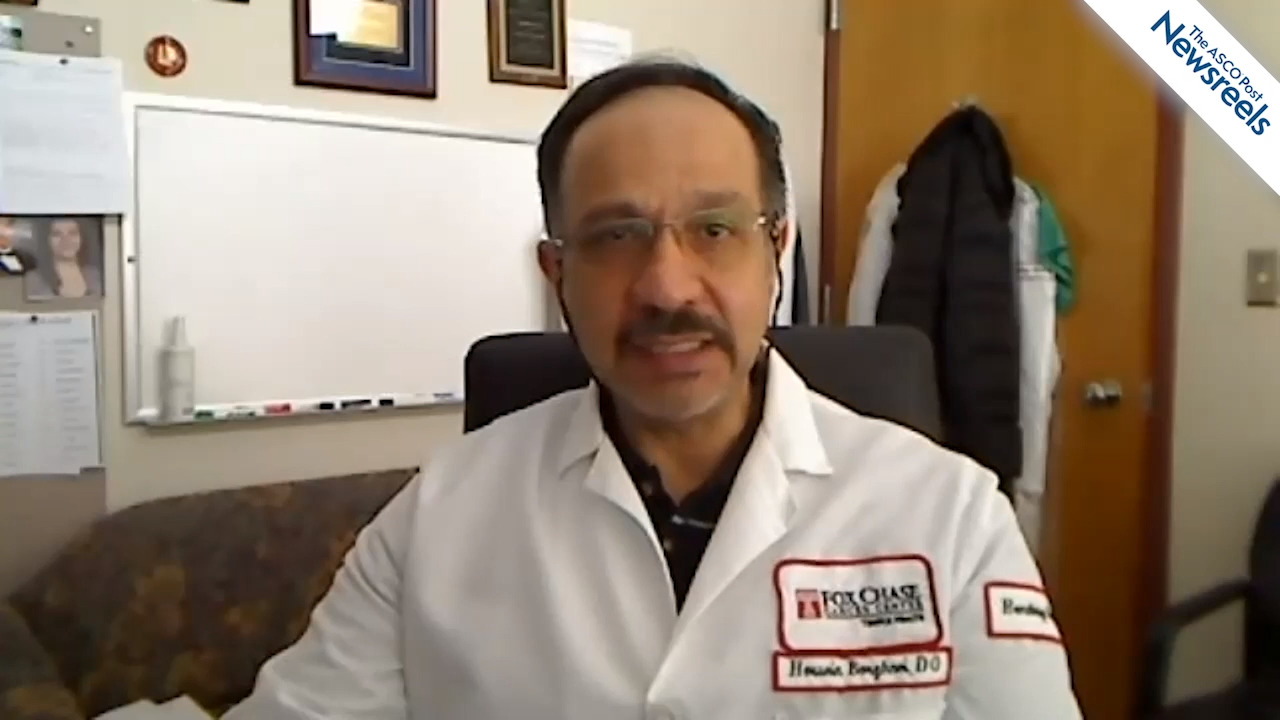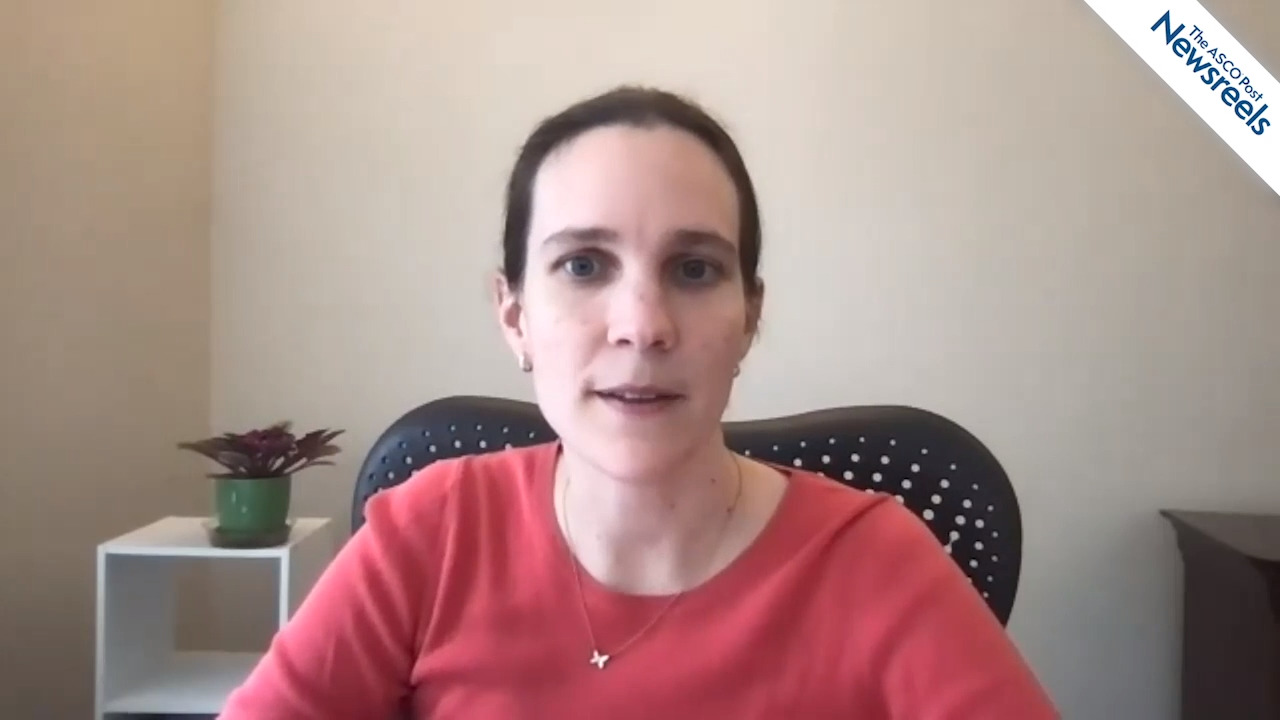FDA Approves Idecabtagene Vicleucel for Heavily Pretreated Patients With Multiple Myeloma
On March 26, the U.S. Food and Drug Administration (FDA) approved idecabtagene vicleucel (Abecma) for the treatment of adult patients with relapsed or refractory multiple myeloma after four or more prior lines of therapy, including an immunomodulatory agent, a proteasome inhibitor, and an anti-CD38 ...
Expert Point of View: Rutika Mehta, MD, MPH
The FIGHT study’s invited discussant, Rutika Mehta, MD, MPH, a gastrointestinal oncologist at Moffitt Cancer Center, Tampa, Florida, noted the emergence of new biomarkers and their targeted agents in HER2-negative gastric or gastroesophageal junction cancer. Two important ones are FGFR2b—now...
Targeting FGFR2b With Bemarituzumab Plus Chemotherapy in Gastric or Gastroesophageal Junction Cancer
Gastric cancer appears to have a new druggable target: fibroblast growth factor receptor 2b (FGFR2b). Targeting FGFR2b with bemarituzumab plus chemotherapy led to clinically meaningful and statistically significant improvements in progression-free survival, overall survival, and response rate in...
Expert Point of View: Elizabeth Smyth, MD
The overall survival benefit for PD-L1 CPS ≥ 5 tumors in CheckMate 649 is a game-changer. An oxaliplatin doublet plus chemotherapy should become a standard of care for these patients,” according to Elizabeth Smyth, MD, an oncology consultant at Cambridge University Hospital NHS Foundation Trust in...
Nivolumab Plus Chemotherapy: New Standard of Care in Advanced Gastric Cancer?
As first-line treatment for advanced gastric cancer, nivolumab plus chemotherapy leads to significantly improved progression-free and overall survival over chemotherapy alone, investigators reported during a Presidential Symposium of the European Society for Medical Oncology (ESMO) Virtual Congress ...
IMbrave150: A New Standard of Care to Treat Hepatocellular Cancers?
In 2007, sorafenib became the first approved systemic therapy for hepatocellular cancers and the first agent to improve overall survival in these patients.1 In a similar multikinase inhibitor strategy, lenvatinib was found to be noninferior to sorafenib in overall survival in the same patient...
Amir A. Jazaeri, MD, on Metastatic Cervical Cancer: The Role of Immunotherapy
Amir A. Jazaeri, MD, of The University of Texas MD Anderson Cancer Center, discusses data on the safety and efficacy of adoptive cell transfer using autologous tumor-infiltrating lymphocytes (LN-145) to treat patients with recurrent, metastatic, or persistent cervical carcinoma whose tumors have progressed on prior systemic therapy (ID # 10224).
Dana M. Roque, MD, on Ovarian, Fallopian Tube, and Peritoneal Cancers: Possible New Therapeutic Option for Heavily Pretreated Disease
Dana M. Roque, MD, of the University of Maryland Medical Center, discusses phase II results showing that weekly ixabepilone plus biweekly bevacizumab may improve overall response rate as well as progression-free and overall survival for women with platinum-resistant or -refractory ovarian, fallopian tube, and primary peritoneal cancers, a population in need of treatment choices.
Challenges in Managing Hodgkin Lymphoma: Focus on Use of Brentuximab Vedotin
“I was taught that the way of progress was neither swift nor easy.” —Marie Curie To complement The ASCO Post’s continued comprehensive coverage of the 2020 American Society of Hematology (ASH) Annual Meeting & Exposition, here are two abstracts selected from the meeting proceedings focusing on...
Next Up in NSCLC: Antibody-Drug Conjugates
Antibody-drug conjugates directed against HER2, HER3, and trophoblast cell-surface antigen 2 (TROP2) are showing encouraging antitumor activity in advanced non–small cell lung cancer (NSCLC), according to research presented during the virtual edition of the International Association for the Study...
Nivolumab Plus Cabozantinib as First-Line Treatment of Advanced Renal Cell Carcinoma
On January 22, 2021, the U.S. Food and Drug Administration approved the combination of nivolumab and cabozantinib as first-line treatment for patients with advanced renal cell carcinoma.1-3 Supporting Efficacy Data Approval was based on the findings of the phase III, open-label CheckMate 9ER trial...
Cardiovascular Risks Associated With Checkpoint Inhibitors and CAR T-Cell Therapy
In just a few years, immunotherapy has risen to become a pillar of cancer care, leading to significantly improved response rates and even cures in previously intractable diseases. Leveraging the immune system to treat cancer, however, also increases the potential for serious off-target effects....
Adjuvant Atezolizumab in Muscle-Invasive Urothelial Carcinoma: IMvigor010
As reported in The Lancet Oncology by Joaquim Bellmunt, MD, PhD, and colleagues, the phase III IMvigor010 trial showed no improvement in disease-free survival with adjuvant atezolizumab vs observation in patients with muscle-invasive urothelial carcinoma. Study Details In the open-label trial, 809...
Shaji K. Kumar, MD, on Multiple Myeloma: NCCN Guidelines Update
Shaji K. Kumar, MD, of the Mayo Clinic Cancer Center, discusses the latest data on treating patients with multiple myeloma, including standard-of-care induction before stem cell transplant; the role of quadruplet induction; long-term results with the combination of daratumumab, lenalidomide, and dexamethasone in those who are ineligible for stem cell transplant; CAR T-cell engagers; and the need for more research on how immunotherapy fits in the sequence of treatments.
Identification of Genomic Subgroups of Patients With Myelodysplastic Syndromes: New Prognostic Modeling
In a study reported in the Journal of Clinical Oncology, Bersanelli et al reported that researchers in the EuroMDS Project found that patients with myelodysplastic syndromes (MDS) could be classified into eight distinct subtypes based on genomic characteristics. They also developed a new prognostic ...
FDA Approves Pembrolizumab Combination for Advanced Esophageal or Gastroesophageal Junction Carcinoma
On March 22, the U.S. Food and Drug Administration (FDA) approved pembrolizumab (Keytruda) in combination with platinum and fluoropyrimidine-based chemotherapy for patients with metastatic or locally advanced esophageal or gastroesophageal junction (tumors with epicenter 1–5 cm above the...
Emily Hinchcliff, MD, MPH, on Treating Non–Clear Cell Ovarian Cancer With Durvalumab and Tremelimumab
Emily Hinchcliff, MD, MPH, of The University of Texas MD Anderson Cancer Center, discusses phase II results of durvalumab (anti–PD-L1) and tremelimumab (anti–CTLA-4) administered in combination vs sequentially for the treatment of recurrent platinum-resistant non–clear cell ovarian cancer (ID #10240).
Niraparib Plus Bevacizumab Shows Clinical Benefit in Patients With Advanced Ovarian Cancer
The addition of niraparib maintenance to first-line platinum-based chemotherapy with bevacizumab demonstrated clinical benefit in patients with advanced ovarian cancer, according to data from the OVARIO study presented by Melissa M. Hardesty, MD, MPH, during the Society of Gynecologic Oncology...
Charles N. Landen, MD, on Newly Diagnosed Ovarian Cancer: BRCA Mutations, PD-L1 Expression, and Combination Chemoimmunotherapy
Charles N. Landen, MD, of the University of Virginia, discusses results from the first clinical trial in ovarian cancer to demonstrate that neither a BRCA1/2 mutation nor a homologous recombination deficiency improves sensitivity to a therapeutic PD-L1 blockade in patients receiving atezolizumab vs placebo combined with carboplatin, paclitaxel, and bevacizumab for newly diagnosed disease (ID #10240).
Hyun C. Chung, MD, on Pembrolizumab for Advanced Cervical Cancer: Update From KEYNOTE-158
Hyun C. Chung, MD, of Yonsei Cancer Center and Yonsei University College of Medicine, discusses phase II findings from the KEYNOTE-158 study, which support the use of pembrolizumab for patients with recurrent or metastatic cervical cancer that has progressed on or after chemotherapy and whose tumors express PD-L1.
Recent Chemotherapy or Immunotherapy for Gynecologic Cancer Does Not Raise Risk of Death Due to COVID-19
Although some studies show that patients with cancer have a greater risk of health complications from COVID-19, a new study has found that recent chemotherapy or immunotherapy for gynecologic cancer does not raise the risk of hospitalization or death due to COVID-19. The study results were...
Pembrolizumab/Lenvatinib May Improve Survival in Advanced Endometrial Cancer
In the first report from the pivotal phase III KEYNOTE-775/Study 309 trial, the combination of lenvatinib and pembrolizumab significantly improved multiple outcomes compared to standard single-agent chemotherapy in patients with advanced, metastatic, or recurrent endometrial cancer that had...
Arlene O. Siefker-Radtke, MD, on Urothelial Bladder Cancer: New Settings for Immune Checkpoint Inhibitors
Arlene O. Siefker-Radtke, MD, of The University of Texas MD Anderson Cancer Center, discusses the changing therapeutic landscape in which atezolizumab, avelumab, and pembrolizumab have either been approved or are under review for treating urothelial bladder cancer in the metastatic, superficial, and adjuvant settings.
Vicky Makker, MD, on Endometrial Cancer: Lenvatinib Plus Pembrolizumab
Vicky Makker, MD, of Memorial Sloan Kettering Cancer Center, discusses phase III findings showing that lenvatinib plus pembrolizumab may improve overall and progression-free survival, as well as overall response rate, compared with treatment of physician’s choice for advanced endometrial cancer. These results were achieved regardless of mismatch repair status following platinum-based chemotherapy (ID #10191).
William J. Gradishar, MD, on Triple-Negative Breast Cancer: NCCN Guidelines Update
William J. Gradishar, MD, of Robert H. Lurie Comprehensive Cancer Center of Northwestern University, discusses the latest recommendations from the National Comprehensive Cancer Network for treating patients with triple-negative breast cancer; data on early-stage and advanced disease; and the role of checkpoint inhibitors, antibody-drug conjugates, and PARP inhibitors.
Utilization and Survival Benefit of Adjuvant Immunotherapy for Resected High-Risk Stage II Melanoma
An observational study of 10,592 patients from the National Cancer Database with stage IIB/IIC melanoma who had undergone surgical resection demonstrated a significant survival advantage with immunotherapy. The research was presented by Wong et al at the Society of Surgical Oncology 2021...
Immunotherapy Doublet as Maintenance Therapy for Extensive-Disease SCLC
As reported in the Journal of Clinical Oncology by Taofeek K. Owonikoko, MD, PhD, and colleagues, the phase III CheckMate 451 trial showed no improvement in overall survival with combined nivolumab and ipilimumab vs placebo as maintenance therapy for extensive-disease small cell lung cancer. Study ...
Pembrolizumab vs Chemotherapy in Previously Treated Patients With Metastatic Triple-Negative Breast Cancer: KEYNOTE-119
As reported in The Lancet Oncology by Eric P. Winer, MD, FASCO, and colleagues, the phase III KEYNOTE-119 trial showed no significant improvement in overall survival with pembrolizumab vs investigator’s choice of chemotherapy in the second- or third-line treatment of metastatic triple-negative...
High Tumor Mutational Burden Predicts Immunotherapy Response in Some—but Not All—Cancers
High tumor mutational burden (TMB) was useful for predicting clinical responses to immune checkpoint inhibitors only in a subset of cancer types, according to a study published by McGrail et al in Annals of Oncology. The findings suggest that TMB status may not be reliably used as a universal...
Novel HER2-Targeted Therapies Pose Sequencing Challenges
With three new HER2-targeted therapies approved in the past 15 months alone, the treatment landscape for patients with metastatic breast cancer has become increasingly crowded. In the third-line setting and beyond, there are now at least eight HER2-targeted agents approved by the U.S. Food and Drug ...
Lowering KRAS Activity May Lead to Improved Therapy Response in Pancreatic Cancer
If clinicians could stop mutations of the KRAS gene—which are present in more than 90% of pancreatic cancer cases and drastically reduce the response to immunotherapy—the chances of improving treatment for the disease would be increased. A collaborative study published by Ischenko et al in Nature...
CheckMate 9ER: First-Line Nivolumab Plus Cabozantinib vs Sunitinib for Advanced Renal Cell Carcinoma
As reported in The New England Journal of Medicine by Toni K. Choueiri, MD, and colleagues, the phase III CheckMate 9ER trial has shown that the combination of nivolumab and cabozantinib improved progression-free survival and overall survival vs sunitinib in first-line treatment of patients with...
FDA Oncologic Drugs Advisory Committee to Review Status of Six Indications Granted Accelerated Approval
Recently, the U.S. Food and Drug Administration (FDA) announced that the agency will hold a public meeting of the Oncologic Drugs Advisory Committee on April 27 to 29 to discuss six indications granted accelerated approval that have since reported results from confirmatory trials that have not...
Immunotherapy for Advanced Kidney Cancer: Effect of Body Mass Index
In a study reported in a research letter in JAMA Oncology, Lalani et al found that higher body mass index (BMI) was associated with better overall survival among patients with metastatic renal cell carcinoma receiving anti–PD-1/PD-L1–based immune checkpoint inhibitor treatment. No association of...
Expert Point of View: Roy S. Herbst, MD, PhD, FACP, FASCO, and Shinichi Toyooka, MD
The ASCO Post reached out to Roy S. Herbst, MD, PhD, FACP, FASCO, Chief of Medical Oncology and Associate Cancer Center Director for Translational Research at Yale Cancer Center and Smilow Cancer Hospital, New Haven, for his thoughts on the LCMC3 trial of neoadjuvant atezolizumab.1 Dr. Herbst led...
Neoadjuvant Atezolizumab in Lung Cancer: LCMC3 Trial Meets Primary Endpoint
Neoadjuvant treatment with single-agent atezolizumab in patients with stage IB to IIIB lung cancer resulted in a major pathologic response rate of 21% and a pathologic complete response rate of 7%, in the primary analysis of the Lung Cancer Mutation Consortium 3 (LCMC3) study.1 The findings were...
Belantamab Mafodotin-blmf Plus Pomalidomide and Dexamethasone Elicits Responses in Myeloma
Belantamab mafodotin-blmf combined with pomalidomide and dexamethasone led to a very good partial response or better in approximately three-quarters of patients with multiple myeloma that was double-class or triple-class refractory, according to Suzanne Trudel, MSc, MD, FRCPC, of Princess Margaret...
Expert Point of View: Rina Hui, MBBS, PhD, and Melina Marmarelis, MD
“It has been a long time coming to see a positive randomized phase III study with a checkpoint inhibitor in relapsed mesothelioma,” said the study’s invited discussant, Rina Hui, MBBS, PhD, Clinical Professor of Medicine, Crown Princess Mary Cancer Centre, Westmead Hospital, University of Sydney,...
CONFIRM Trial Reports Improvement in Survival With Nivolumab in Relapsed Malignant Mesothelioma
For the first time, a treatment has been shown to improve overall survival in heavily pretreated patients with relapsed malignant mesothelioma. In the phase III CONFIRM trial, single-agent nivolumab led to a significant improvement in both overall and progression-free survival, according to...
Miami Breast Cancer Conference: Updated DESTINY-Breast01 Results Show Trastuzumab Deruxtecan-nxki Delivers Durable Responses
In updated results from the pivotal DESTINY-Breast01 trial, trastuzumab deruxtecan-nxki (T-DXd) demonstrated high rates of durable responses consistent with prior results, with encouraging progression-free survival and overall survival in patients with HER2-positive metastatic breast cancer. These...
Hossein Borghaei, DO, on Bispecific T-Cell–Engager Immune Therapy for Small Cell Lung Cancer
Hossein Borghaei, DO, of Fox Chase Cancer Center, discusses phase I results from a study of AMG 757, an experimental bispecific T-cell–engager (BiTE) immune therapy aimed at the DLL3 molecular target in patients with small cell lung cancer. At this early stage, results show clinical efficacy and safety, with 37% of 51 evaluable patients exhibiting disease control (Abstract OA11.03).
Atezolizumab’s Indication in Previously Treated Metastatic Bladder Cancer Is Withdrawn
Genentech, a member of the Roche Group, announced on March 8 that the company is voluntarily withdrawing the U.S. indication for atezolizumab (Tecentriq) in patients with prior platinum-treated metastatic urothelial carcinoma. This decision was made in consultation with the U.S. Food and Drug...
FDA Grants Accelerated Approval to Axicabtagene Ciloleucel for Relapsed or Refractory Follicular Lymphoma
On March 5, the U.S. Food and Drug Administration (FDA) granted accelerated approval to axicabtagene ciloleucel (Yescarta) for adult patients with relapsed or refractory follicular lymphoma after two or more lines of systemic therapy. ZUMA-5 Approval in follicular lymphoma was based on a...
Study Reports Little Benefit to Adding Pembrolizumab to Neoadjuvant Therapy for Locally Advanced Rectal Cancer
The addition of pembrolizumab to neoadjuvant chemotherapy and radiotherapy (ie, total neoadjuvant therapy) failed to improve a rectal cancer–specific surrogate for survival in patients with locally advanced disease in the phase II NRG-GI002 trial.1 As reported at the 2021 Gastrointestinal Cancers...
Idecabtagene Vicleucel for Heavily Pretreated Patients With Relapsed or Refractory Multiple Myeloma
In the pivotal phase II KarMMa study reported in The New England Journal of Medicine, Nikhil C. Munshi, MD, and colleagues found that the B-cell maturation antigen–directed chimeric antigen receptor (CAR) T-cell therapy idecabtagene vicleucel produced high response rates in patients with...
Study Identifies Mechanisms Tied to Immunotherapy Resistance Among Patients With Melanoma
Researchers have created a new technique that may help to uncover mechanisms cancer cells use to evade immunotherapies, which could lead to the development of more effective treatments. Investigators tested their new technique with cancer cells and matching immune cells from patients with melanoma...
Five-Year Outcomes With Tisagenlecleucel in Patients With Relapsed or Refractory B-Cell Lymphomas
As reported in a letter to the editor in The New England Journal of Medicine by Elise A. Chong, MD, and colleagues, long-term follow-up of a single-center trial of tisagenlecleucel showed maintained responses in a high proportion of patients with relapsed or refractory diffuse large B-cell lymphoma ...
Tracy L. Rose, MD, on Bladder Cancer: Gemcitabine, Cisplatin, and Pembrolizumab as Neoadjuvant Therapy
Tracy L. Rose, MD, of the University of North Carolina at Chapel Hill, discusses phase II results of gemcitabine and split-dose cisplatin plus pembrolizumab as neoadjuvant therapy prior to radical cystectomy for patients with muscle-invasive bladder cancer. The trial showed this combination treatment is generally safe and may improve pathologic downstaging, but further study is warranted (Abstract 396).
KEYNOTE-427: First-Line Pembrolizumab in Advanced Non–Clear Cell Renal Cell Carcinoma
As reported in the Journal of Clinical Oncology by McDermott et al, findings in a cohort of the phase II KEYNOTE-427 study showed that pembrolizumab monotherapy produced durable responses as first-line treatment for advanced non–clear cell renal cell carcinoma. In a separate cohort of the study,...
I Let Science, Not Emotion, Dictate My Treatment
I had my first experience with cancer when I was just 3 or 4 years old and complained to my mother that my “tummy hurt.” I was diagnosed with Wilms tumor, the same cancer my 18-month-old brother died of before I was born. I remember being in the hospital for weeks at a time and being known by...
